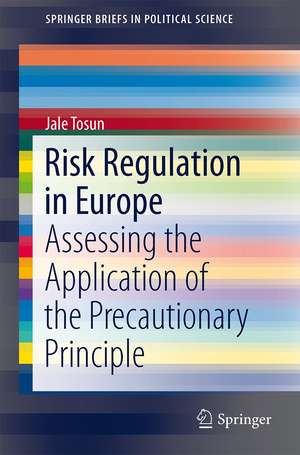Risk Regulation in Europe: Assessing the Application of the Precautionary Principle: SpringerBriefs in Political Science, cartea 3
Autor Jale Tosunen Limba Engleză Paperback – 6 noi 2012
Din seria SpringerBriefs in Political Science
-
 Preț: 410.94 lei
Preț: 410.94 lei -
 Preț: 259.57 lei
Preț: 259.57 lei -
 Preț: 375.62 lei
Preț: 375.62 lei -
 Preț: 478.53 lei
Preț: 478.53 lei -
 Preț: 411.16 lei
Preț: 411.16 lei -
 Preț: 379.48 lei
Preț: 379.48 lei -
 Preț: 226.22 lei
Preț: 226.22 lei -
 Preț: 378.71 lei
Preț: 378.71 lei -
 Preț: 342.25 lei
Preț: 342.25 lei -
 Preț: 379.48 lei
Preț: 379.48 lei -
 Preț: 443.58 lei
Preț: 443.58 lei -
 Preț: 125.07 lei
Preț: 125.07 lei -
 Preț: 358.32 lei
Preț: 358.32 lei -
 Preț: 475.65 lei
Preț: 475.65 lei -
 Preț: 379.48 lei
Preț: 379.48 lei -
 Preț: 375.84 lei
Preț: 375.84 lei -
 Preț: 378.54 lei
Preț: 378.54 lei -
 Preț: 342.84 lei
Preț: 342.84 lei -
 Preț: 379.68 lei
Preț: 379.68 lei -
 Preț: 309.04 lei
Preț: 309.04 lei - 15%
 Preț: 520.30 lei
Preț: 520.30 lei -
 Preț: 380.84 lei
Preț: 380.84 lei -
 Preț: 374.85 lei
Preț: 374.85 lei -
 Preț: 377.73 lei
Preț: 377.73 lei -
 Preț: 378.54 lei
Preț: 378.54 lei -
 Preț: 444.94 lei
Preț: 444.94 lei -
 Preț: 374.85 lei
Preț: 374.85 lei -
 Preț: 379.86 lei
Preț: 379.86 lei -
 Preț: 476.21 lei
Preț: 476.21 lei -
 Preț: 377.73 lei
Preț: 377.73 lei -
 Preț: 444.13 lei
Preț: 444.13 lei -
 Preț: 446.65 lei
Preț: 446.65 lei -
 Preț: 444.52 lei
Preț: 444.52 lei -
 Preț: 376.59 lei
Preț: 376.59 lei -
 Preț: 376.59 lei
Preț: 376.59 lei -
 Preț: 375.07 lei
Preț: 375.07 lei -
 Preț: 261.53 lei
Preț: 261.53 lei -
 Preț: 376.22 lei
Preț: 376.22 lei -
 Preț: 259.57 lei
Preț: 259.57 lei -
 Preț: 380.07 lei
Preț: 380.07 lei -
 Preț: 261.32 lei
Preț: 261.32 lei -
 Preț: 375.45 lei
Preț: 375.45 lei -
 Preț: 310.18 lei
Preț: 310.18 lei -
 Preț: 378.54 lei
Preț: 378.54 lei - 5%
 Preț: 356.11 lei
Preț: 356.11 lei -
 Preț: 477.34 lei
Preț: 477.34 lei -
 Preț: 343.72 lei
Preț: 343.72 lei - 15%
 Preț: 462.05 lei
Preț: 462.05 lei -
 Preț: 379.30 lei
Preț: 379.30 lei -
 Preț: 378.71 lei
Preț: 378.71 lei
Preț: 344.25 lei
Nou
Puncte Express: 516
Preț estimativ în valută:
65.88€ • 68.53$ • 54.39£
65.88€ • 68.53$ • 54.39£
Carte tipărită la comandă
Livrare economică 14-28 aprilie
Preluare comenzi: 021 569.72.76
Specificații
ISBN-13: 9781461419839
ISBN-10: 1461419832
Pagini: 116
Ilustrații: XI, 102 p. 1 illus.
Dimensiuni: 155 x 235 x 6 mm
Greutate: 0.17 kg
Ediția:2013
Editura: Springer
Colecția Springer
Seria SpringerBriefs in Political Science
Locul publicării:New York, NY, United States
ISBN-10: 1461419832
Pagini: 116
Ilustrații: XI, 102 p. 1 illus.
Dimensiuni: 155 x 235 x 6 mm
Greutate: 0.17 kg
Ediția:2013
Editura: Springer
Colecția Springer
Seria SpringerBriefs in Political Science
Locul publicării:New York, NY, United States
Public țintă
ResearchCuprins
Introduction.- The precautionary principle.- Case Study 1: Ban of imports of hormone-treated beef.- Case Study 2: Ban of the natural sweetener Stevia.- Case Study 3: Legalization of genetically modified crops.- Explaining the uneven application of the precautionary principle.- Conclusion.
Textul de pe ultima copertă
The publication aims to familiarize students of public policy with the precautionary principle, which plays a vital role in the European Union’s approach toward regulating risks. The precautionary principle contends that policy makers should refrain from actions having a suspected risk of causing harm to the public and/or the environment. However, the precautionary principle only provides guidance to policy makers but does not prescribe specific policy responses. Therefore, there should be variation in the way the principle is applied. Furthermore, precautionary measures are, in principle, of a provisional nature, suggesting that they are likely to be subject to changes over time. This book is thus interested in shedding light on how the precautionary principle is put into practice and to what extent precautionary measures become modified. Empirically, it focuses on how the EU has regulated the use of growth hormones in meat production, the cultivation of genetically modified corn and the use of Stevia-based sweeteners in foods and beverages. The main theoretical argument advanced by this study is that the way in which the original regulatory standards were formulated affects whether and how they are changed. By placing particular emphasis on the relevance of scientific evidence for the (re-)definition of precautionary measures, the book is expected to appeal to both academics and practitioners.
Caracteristici
Risk Regulation in Europe Includes supplementary material: sn.pub/extras













